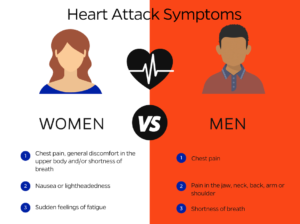Heart Attack Symptoms in Men vs. Women
According to the Centers for Disease Control, a heart attack occurs every 40 seconds in the United States: roughly the time it takes to send a text or drink a glass of water. Surprisingly, one in five people don’t feel any symptoms, even as damage occurs.
So, how can you recognize if you’re having a heart attack? While sudden chest pain or left-arm pain is often associated with heart attacks, especially for men, symptoms can vary widely by biological sex. Many women experience different, less recognized signs. Knowing the symptoms specific to your sex can make a life-saving difference.
Heart Attacks: The Basics
While heart attacks can appear sudden or out of the blue, they often occur in people with underlying heart disease: a broad term that covers various conditions impacting heart health. Common types of heart disease include:
- Coronary artery disease
- Arrhythmias
- Congenital heart defects
- Heart valve disease
While congenital heart defects are present from birth, other heart conditions typically develop over time, often due to lifestyle factors. In addition, people with heart disease are more likely to experience a heart attack than those without.
A heart attack occurs when blood flow to the heart is blocked, stopping circulation and oxygen to heart tissue. The longer the delay in restoring blood flow, the greater the potential damage to the heart muscle. Early treatment is crucial to minimize harm and improve recovery outcomes, which is why it’s so important to understand the symptoms you may experience depending on your sex.
Why Are Women’s Heart Attack Symptoms Different From Men’s?
There are several potential reasons why women might not always experience the same symptoms as men during a heart attack:
- Biological differences
Women often have smaller hearts and blood vessels than men, which affects how heart disease develops. This difference can lead to more blockages in the smaller coronary arteries, resulting in atypical symptoms like shortness of breath, fatigue and jaw or back pain rather than the intense chest pain commonly seen in men.
- Hormonal differences
Before menopause, estrogen can provide a protective effect on women’s hearts. After menopause, when estrogen levels decrease, women’s heart disease risk rises sharply. This shift can contribute to the onset of different heart attack symptoms.
Common Heart Attack Symptoms in Women
While chest pain is still the leading symptom of heart attacks in women (as well as men), there are other signs to look for. Recognizing these signs can make a critical difference, leading to faster treatment and potentially saving heart muscle in the process.
Here are some other common women’s heart attack symptoms:
- Sudden dizziness.
- Heartburn-like discomfort that may be mistaken for acid reflux.
- Unusual fatigue without a clear reason.
- Nausea or vomiting, especially when accompanied by other symptoms.
- Pain in the upper body, including one or both arms, the back, neck, jaw or stomach.
Symptoms of a Heart Attack in Men
For men, some of the most common symptoms of a heart attack include:
- Chest pain: This often feels like a sudden pressure, squeezing or tightness in the left or center of the chest.
- Shortness of breath: This symptom is more common in older adults and can occur before or while experiencing chest pain.
- Pain in the upper body: Men often experience discomfort in the arms, jaw, stomach, neck or back during a heart attack.

Become a Leader in Cardiovascular Health
Recognizing the differences in men and women’s heart attack symptoms is essential to acting quickly if you or someone you know experiences signs of a heart attack. If you’re captivated by the cardiovascular system and passionate about helping others prevent and manage heart disease, have you considered a career in medicine?
Whether you aim to become a physician, researcher or another healthcare professional, the University of Florida can help you take the next step. Our online Graduate Certificate in Medical Physiology with a Specialization in Cardiovascular/Renal Physiology is a 12-credit program that offers a comprehensive foundation in five key body systems, with a special focus on areas like hypertension and blood circulation. For a broader skill set, explore our other graduate degrees and certificates tailored to meet your interests and career goals.
All programs are entirely online and ideal for working professionals seeking career advancement while maintaining a balanced work-life schedule. Plus, with competitive tuition and year-round start dates, we’re ready to welcome you whenever you’re ready to begin your next chapter.
Sources:
https://www.cdc.gov/heart-disease/data-research/facts-stats/index.html
https://www.mayoclinic.org/diseases-conditions/heart-disease/symptoms-causes/syc-20353118
https://give.brighamandwomens.org/7-differences-between-men-and-women/



